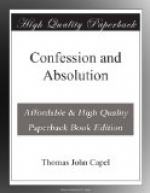Why then not concede to priests at least this same measure of honorability? They, like doctors and lawyers, must for their work be theoretically cognizant of the crimes, iniquities, and weaknesses of mankind. But they, no more than doctors or lawyers, speak of these things, unless the penitent has been guilty of and confesses some such offence. On the contrary, those who enter the Ministry are taught to be most prudent and discreet in putting questions; never to ask more than what may be necessary. The rule is to err on the side of too little. Nay, rather than suggest or make known that which a penitent may be ignorant of, the minister must consult more what is for the good of the soul than for the integrity of the Confession.
2. Again, let it be remembered that it is not as in a court of justice, where the plea of “not guilty” is set up, and all has then to be wormed out by examination in the most detailed manner. For the penitent enters the confessional as self-accuser, states the offence, together with the number of times it has happened, and any circumstances which may alter or aggravate the deed. There are, therefore, in Confession, none of the nauseous details and descriptions of crime which may be heard in our courts and read in our newspapers.
The remarkable testimony of a Protestant gentleman—Doctor Forbes—may here be of much value. In his memorandums, made in Ireland in the autumn of 1852, he says: “At any rate, the result of my inquiries is that—whether right or wrong in a theological or rational point of view—this instrument of Confession is, among the Irish of the humbler classes, a direct preservative against certain forms of immorality at least."[58] “Among other charges preferred against Confession in Ireland and elsewhere, is the facility it affords for corrupting the female mind, and of its actually leading to such corruption. * * * So far from such corruption resulting from the Confessional, it is the general belief in Ireland—a belief expressed to me by many trustworthy men in all parts of the country, and by Protestants as well as by Catholics—that the singular purity of female life among the lower classes there is, in a considerable degree, dependent on this very circumstance."[59] “With a view of testing, as far as was practicable, the truth of the theory respecting the influence of Confession on this branch of morals, I have obtained, through the courtesy of the Poor Law Commissioners, a return of the number of legitimate and illegitimate children in the work-houses of each of the four provinces in Ireland, on a particular day, viz: the 27th of November, 1852. * * * It is curious to mark how strikingly the results there conveyed correspond with the confessional theory: the proportion of illegitimate children coinciding almost exactly with the relative proportions of the two religions in each province; being large where the Protestant element is large, and small where it is small."[60]




